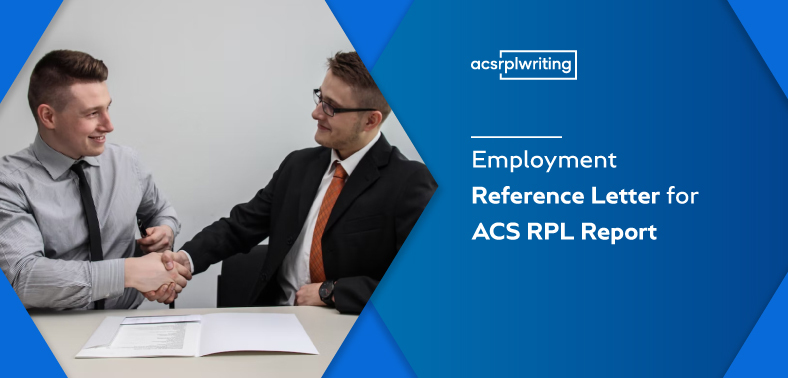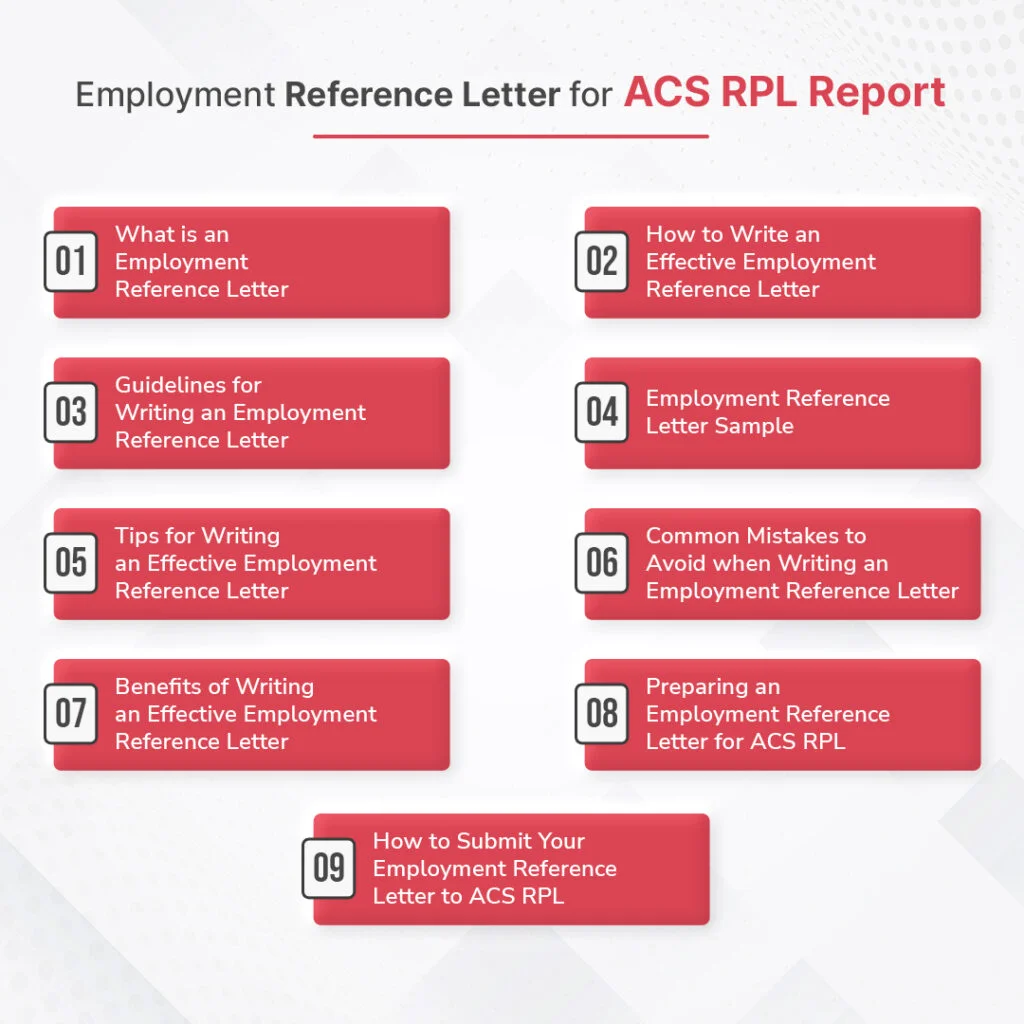Employment Reference Letter for ACS RPL Report

An Employment Reference Letter for ACS is essential for those candidates without an ICT degree or insufficient ICT qualifications, the RPL project report and employment reference letter must be submitted to Australian Computer Society (ACS) in order to demonstrate their capability according to ACS standards. This document shows the candidate’s work experience and knowledge in the field nominated. Also when applying for permanent residency in Australia, an ACS RPL (Recognition of Prior Learning) report is required to demonstrate your skills and experience. A well-crafted Employment Reference Letter (ERL) is an important part of this report, as it can provide insight into your work performance and capabilities. Writing an effective ERL is essential to ensure that your application stands out from the rest.

1.What is an Employment Reference Letter?
An Employment Reference Letter (ERL) is a document written by a former employer or colleague, which provides an overview of your work ethic, performance, and capabilities. It is necessary for candidates who do not hold an ICT degree or who have insufficient ICT qualifications to submit a RPL project report and an employment reference letter to the Australian Computer Society (ACS) .
An Employment Reference Letter contains a detailed description of the applicant’s job responsibilities, performance, and achievements. It also provides an opportunity for the writer to provide a personal opinion about the applicant’s qualifications. The letter should be written professionally and concisely and should include relevant details about the applicant’s work experience.
2.How to Write an Effective Employment Reference Letter
Writing an effective Employment Reference Letter requires the writer to provide a detailed and accurate account of the applicant’s work experience. The letter should include information about the applicant’s job responsibilities, performance, and any special achievements they may have had during their employment.
The following guidelines will help you write an effective Employment Reference Letter:
- Start by introducing yourself and providing a brief description of the applicant’s qualifications and job responsibilities.
- Describe the applicant’s work performance, including any special achievements they may have had during their employment.
- Provide details of the applicant’s interpersonal skills, such as their ability to work in teams and their communication skills.
- Provide an overview of the applicant’s work ethic, such as their reliability, punctuality, and dedication.
- Provide details of the applicant’s leadership qualities, such as their ability to manage teams and motivate other employees.
- Provide an overall assessment of the applicant’s work performance and capabilities.
- Conclude the letter by expressing your willingness to provide further information about the applicant and wishing them success in their future endeavors.
3.Guidelines for Writing an Employment Reference Letter
When writing an Employment Reference Letter, there are some important guidelines to keep in mind:
- Make sure to include accurate and detailed information about the applicant’s work experience.
- Make sure to use professional language, avoiding the use of informal language and slang.
- Make sure to provide an accurate and honest assessment of the applicant’s work performance and capabilities.
- Make sure to use a formal letter format, including all the necessary information such as contact details, date, and address.
- Make sure to proofread the letter for any errors before submitting it.
4.Employment Reference Letter Sample
You can observe the Employment Reference Letter Sample in the given below :
To Whom It May Concern,
I am writing to provide a reference for [Applicant Name], who worked as a [Position] with [Company Name] from [Start Date] to [End Date].
During his employment, [Applicant Name] was responsible for [list job responsibilities]. He was an excellent employee, and I was always impressed by his work ethic, dedication, and attention to detail. He was able to work effectively in teams and was always willing to take on additional responsibilities.
[Applicant Name] was a reliable and punctual employee, and he was always willing to go the extra mile to ensure the successful completion of tasks. He was an effective leader and was able to motivate other employees to achieve their goals.
Overall, [Applicant Name] was a valuable asset to our team, and I can confidently recommend him for any future opportunities.
Should you require any further information about [Applicant Name], please do not hesitate to contact me.
Sincerely, [Your Name]
5.Tips for Writing an Effective Employment Reference Letter
Here are some tips to help you write an effective Employment Reference Letter:
- Make sure to include accurate and detailed information about the applicant’s work experience.
- Make sure to provide an accurate and honest assessment of the applicant’s work performance and capabilities.
- Make sure to use a formal letter format, including all the necessary information such as contact details, date, and address.
- Make sure to use professional language, avoiding the use of informal language and slang.
- Make sure to proofread the letter for any errors before submitting it.
Learn More : What should we consider while writing Employment Reference Letter?
6.Common Mistakes to Avoid when Writing an Employment Reference Letter
When writing an ERL, there are some common mistakes to avoid:
- Don’t use overly flowery language or exaggerate the applicant’s accomplishments.
- Don’t provide inaccurate or false information about the applicant’s work experience.
- Don’t provide opinions about the applicant’s personal life or character.
- Don’t provide opinions about the applicant’s future prospects.
- Don’t include any personal or sensitive information about the applicant.
- Don’t forget to include your contact details at the end of the letter.
7.Benefits of Writing an Effective Employment Reference Letter
Writing an effective ERL can provide many benefits to the applicant. An ERL can be used to demonstrate the applicant’s work ethic, performance, and capabilities, which can help them stand out from the competition. In the context of an ACS RPL report, an ERL can be used to provide evidence of the applicant’s skills and experience, which is necessary for the assessment.
8.Preparing an Employment Reference Letter for ACS RPL
When preparing an ERL for an ACS RPL report, it is important to make sure that the letter is accurate and detailed. The letter should include information about the applicant’s job responsibilities, performance, and any special achievements they may have had during their employment.
The letter should be written professionally and concisely and should include relevant details about the applicant’s work experience. It should also include an overall assessment of the applicant’s work performance and capabilities, as well as contact details for the writer in case further information is needed.
9.How to Submit Your Employment Reference Letter to ACS RPL
Once you have written an effective Employment Reference Letter, you can submit it to ACS RPL as part of your application. You should submit the letter in the same format as you received it, with all the necessary information included.
If you are submitting the letter electronically, you should make sure to check that all the necessary fields are completed correctly. If you are submitting the letter by mail, you should make sure to include a self-addressed envelope for the return of the letter.
Conclusion
Writing an effective Employment Reference Letter (ERL) is an important part of an ACS RPL report. A well-crafted ERL can provide evidence of the applicant’s skills and experience, which is necessary for those candidates with non ICT degrees or insufficient ICT qualifications.
When writing an ERL, it is important to make sure that the letter is accurate and detailed. The letter should include information about the applicant’s job responsibilities, performance, and any special achievements they may have had during their employment. Furthermore, the letter should be written professionally and concisely and should include contact details for the writer in case further information is needed.
Why Choose acsrplwriting for an Effective Employment Reference Letter for Your ACS RPL Report ?
In order to complete the Australia immigration process, acsrplwriting provide you with the finest employment reference letters. The candidates who do not have qualifications in the ICT sector are required to submit an RPL project report along with an employment reference letter to Australian Computer Society (ACS). Therefore, candidates without an ICT degree can demonstrate their competency and be positively assessed. In addition to applicants’ knowledge and skills, ACS evaluates their work experience and skills.

